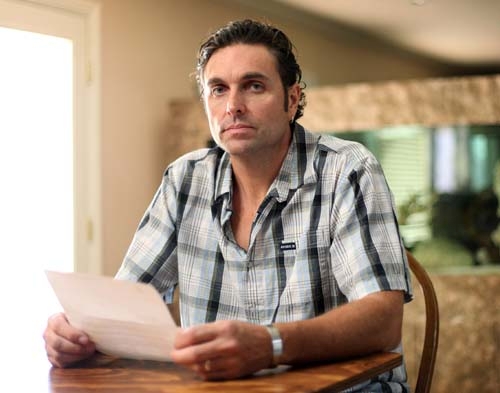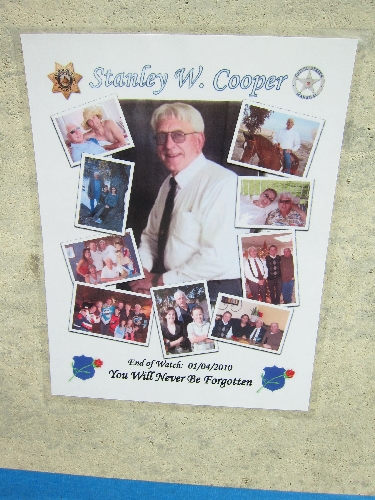Family of slain court officer denied benefits




The family of slain court security officer Stan Cooper has been denied benefits reserved for survivors of fallen public safety officers.
And while Cooper’s adult children appeal the decision, they are sending letters to other court security officers across the country to let them know their families could face the same fate.
“There is no legal guarantee that a CSO will be recognized for the sacrifice made in the case of death in the line of duty,” Cooper’s family wrote. “Your function as a CSO is equally important as of any other officer, but if you are a victim of a crime while at work, you may not be compensated as such.”
A gunman fatally shot Cooper, 72, on Jan. 4, 2010, at the entrance of the Lloyd George U.S. Courthouse in downtown Las Vegas. He never had a chance to draw his own weapon, but other court security officers returned fire and kept the gunman from going farther into the courthouse.
“My dad was in the first line of defense and helped save a lot of people that day, and he gave his life,” Las Vegas resident Marty Cooper said.
Stan Cooper, a retired Las Vegas police officer, worked for a federal contractor, Akal Security, but he went through training at the U.S. Marshals Service academy.
In April 2010, Cooper was honored at a Marshals Service awards ceremony in Arlington, Va., where several relatives accepted the Fallen Hero Award on his behalf. This year, his name was added to the National Law Enforcement Officers Memorial in Washington, D.C.
But last month, Marty Cooper was notified that his claim for payment under the Public Safety Officers’ Benefits Act had been denied.
“The claimant has not established that Court Security Officer Cooper was a public safety officer serving a public agency in an official capacity at the time of his death, according to the PSOB Act and its implementing regulations,” according to the claim determination.
Cooper’s two sons, two stepsons and a daughter were seeking about $311,000 in benefits, Marty Cooper said.
Bert Koch, who worked with Cooper as a police officer and as a court security officer, is not surprised the family’s claim was denied. But Koch thinks the family should receive the compensation.
Koch said Cooper had authority while on courthouse property as a “special deputy U.S. marshal.”
“He had power of arrest. He had handcuffs. He had a gun. He had a badge,” the retired officer said.
And if trouble occurred, Koch said, Cooper would have been expected to take action. He pointed out that other security officers did just that, putting their lives on the line after Cooper was shot.
Koch said former police officers are hired as court security officers for a reason.
“They’re doing law enforcement work,” he said.
According to a fact sheet from the Justice Department’s Bureau of Justice Assistance, the Public Safety Officers’ Benefits Program was enacted in 1976 and provides death benefits to survivors of fallen law enforcement officers, firefighters and other first responders.
Because Cooper was not married, no one is receiving his pension, Marty Cooper said. The son also said no one in the family was eligible for workers’ compensation benefits related to Cooper’s death.
“Every time we turn around, everything is just completely denied,” Marty Cooper said.
Carolie Heyliger, research manager for the National Law Enforcement Officers Memorial, said Cooper was the third federal court security officer to have his name added to the wall. The memorial, dedicated in 1991, honors law enforcement officers who have died in the line of duty.
More than 19,000 names have been carved on the memorial’s two marble walls. New names of fallen officers are added to the monument each spring.
The National Law Enforcement Officers Memorial Fund website includes a profile of Cooper and lists his department as the U.S. Marshals Service.
No one at Akal Security could be reached for comment on this story. According to the New Mexico company’s website, “Akal is the largest provider of contract Judicial Security services, protecting federal courthouses in 40 states.”
Cooper spent 26 years as a Las Vegas police officer before retiring as a sergeant in 1990. He started his career as a court security officer in 1994.
According to evidence presented at a coroner’s inquest, held whenever someone dies at the hands of a law enforcement officer in Clark County, Cooper was sitting in a chair at the courthouse entrance when gunman Johnny Lee Wicks fired a shotgun at him through the opening of a metal detector.
Seven officers fired a total of 85 shots in the gunbattle that ensued.
Authorities believe Wicks held a grudge against the federal government. He had lost a federal lawsuit over denial of some disability benefits.
Wicks fired his shotgun five times, including three times in the courthouse lobby. All of the officers who fired back had handguns.
Deputy U.S. Marshal Richard “Joe” Gardner, 48, testified that he was checking his email on the second floor of the courthouse when he heard the first shotgun blast. He emerged from a door on the west side of the building and encountered Wicks.
“I fired four rounds at Mr. Wicks as he fled from one cover to the next,” Gardner testified at the inquest.
The witness said shotgun pellets struck him in the torso, arm, hand and head but missed vital organs. He said he later underwent surgery.
Wicks, 66, died across the street after being hit 14 times.
One visible change in security since the shooting is that courthouse security officers now wear bullet-resistant vests.
Contact reporter Carri Geer Thevenot at cgeer@reviewjournal.com or 702-384-8710.












